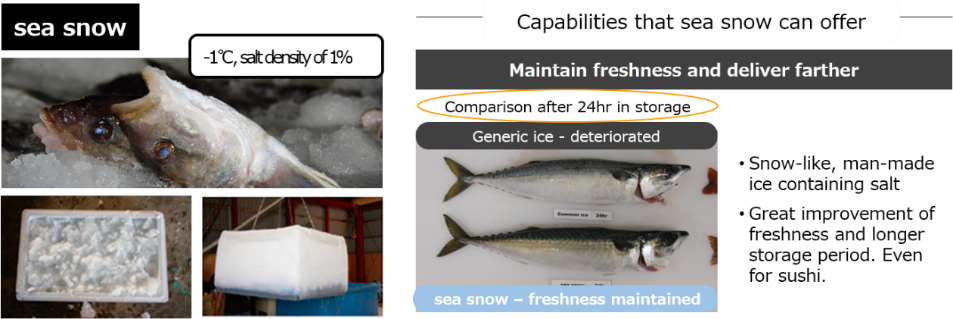 Snow Ice Flakes Made from Sea
Snow Ice Flakes Made from Sea
Water Stably Keep Ingredients Temperature of -1℃ with Salt Concentration of 1%
The “sea snow” produces snow-like ice from sea water or salty water. The resulting “sea snow” can maintain a sub-zero temperature of around -1℃ for a long period of time, unlike the generic flake ice that is widely used in the fishery sector all over the world. The snow-like ice helps prevent scratches and damage to the fish’s body during delivery.
The salt density of “sea snow” is almost identical to that of the fluids inside fish bodies, which prevents water transfer and makes it possible to maintain freshness. Additionally, because “sea snow” contains air, its lower weight can contribute to cutting logistical costs, as well as providing better insulation than generic water ice.
Major Features and Advantages
- Freshness
Enables to keep fishery products very fresh by storing products refrigerated at -1℃ with salt density of 1% which is almost identical to that of the fluids inside fish bodies - Less damage
Snow-like ice helps prevent scratches and damage to the fish’s body during delivery
Technology Data
Possible applications
In short-term, we consider “sea snow” can contribute in the following three goals.
The goals include;
(1) increasing sales opportunities by decreasing the volume of deteriorated fish
(2) adding value to fishery products
(3) expanding exportable market and creating new business opportunities.
Mid-term outcome would be rising income levels of fishermen, and related parties including exporters.
In long-term, “sea snow” can contribute to develop fishery industry by strengthening their competitiveness, increasing the value of fishery products and expanding the market.
Competitive advantage
The “sea snow” has a competitive advantage in the refrigeration technology that enables to keep fishery products fresher in a longer period.
It enables to keep fishery products very fresh by storing products refrigerated at -1℃ with salt density of 1%.
Also, volume of sea snow is lighter than regular ice so that it can reduce transportation cost. This will contribute to develop an advanced cold chain with an affordable cost.
Moreover, “sea snow” has a competitive advantage in contribution to the environment by using sea water instead of tap water. It will also contribute to reduce running cost.
Initial cost will just be purchasing cost of “sea snow” and running cost will be electricity, water and salt if needed (water and salt are not necessary if sea water is available). It also requires spare parts in case of fixing.
 Fig. 1 Advantages of freezer storage by sea snow
Fig. 1 Advantages of freezer storage by sea snow
Performance
It enables to maintain fishery products without any damage by keeping fishery products refrigerated at -1℃ with salt density of 1% which is the same density as fluid of fish.
There are two methods for making saline solutions which can be frozen to be ice flakes in “sea snow”. When seawater is utilized, the following conditions are desireble.
Turbidity: 0~1 NTU
SiO2(silicon dioxide): less than 100 ppm
Oil content: zero
A mixture of tap water and commercial salt are also available for “sea snow”. When commercial salt is used, salinity of 98% or more is desirable.
 Fig. 2 Specification of “sea snow”
Fig. 2 Specification of “sea snow”
Technical maturity / Past record of introduction
FY18: 3 (2 in Japan and 1 in other country) as of January 2019
South Korea
Use in fishing boats and fishing ports for the purpose of maintaining the freshness of shiira(common dolphinfish), which is difficult to maintain freshness.
Information on patent related to this technology
N/A
Company Data
| Name | MARS Company |
| Address | Tonyamachinishi 1-1-2 Takasaki, Gunma, Japan |
| Capital | 99 million JPY (as of June 30, 2019) |
| Contact person |
CEO Masaki OHNO
E-mail:contact_us@mars-company.jp +81-27-386-9111 |
| Number of employees | 10 (as of June 30, 2019) |
| Date of company foundation | July 7, 2006 |
| The type of business |
Manufacturing, sales and R&D |
International operation
| Number of employees for international operation |
3 |
|
| Overseas offices |
City, Country | Name of Company (if applicable) |
| N/A | N/A | |
Modality of business transaction
Direct investment
Core components which produce special ice flake will be exported from MARS Company (Japan), and refrigerators and coolers are selected from local companies and assemble them at local factory. Investment for Establish local factories and support bases will be made with MARS and partner company in the company and its partner companies in Japan or local company.
Partnership
Local Partner will import core components which produce special ice flake from MARS Company (Japan), and assemble it with local refrigerators, local coolers and other components at local factory.
The local partner has also responsibility to set up service and maintenance network and MARS Company will provide local companies with technical guidance necessary for service and maintenance.
Attachments
Schematic illustration of the technology
Product Video
Japanese verison
French version
Contact Person(s)
*Please mention that you saw UNIDO's website when making the first contact with the company.
Registered Category
- Agribusiness Technologies : Food value chain

